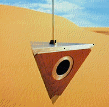When man ceases to wander, he will cease to ascend in the scale of being. . . .
Modern science has imposed on humanity the necessity for wandering. Its progressive thought and its progressive technology make the transition through time, from generation to generation, a true migration into uncharted seas of adventure. The very benefit of wandering is that it is dangerous and needs skill to avert evils. We must expect, therefore, that the future will disclose dangers. It is the business of the future to be dangerous; and it is among the merits of science that it equips the future for its duties.
- Alfred North Whitehead, Science and the Modern World
Related:
The significant problems we face cannot be solved at the same level of thinking we were at when we created them.
- Attributed to Albert Einstein












